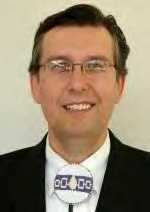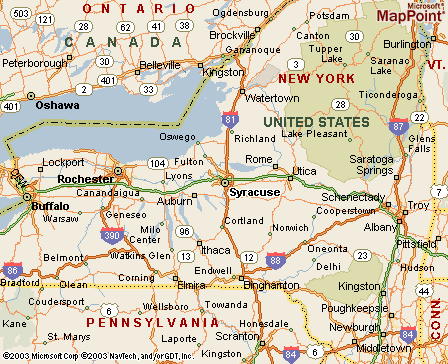|
|
Canku Ota |
|
|
(Many Paths) |
||
|
An Online Newsletter Celebrating Native America |
||
|
November 29, 2003 - Issue 101 |
||
|
|
||
|
Centering on Indian Issues |
||
|
by Scott Rapp The Post Standard
|
||
|
This fall, Porter returned to Syracuse University, his alma mater, where he was hired to develop the College of Law's new Center for Indigenous Law, Governance & Citizenship. The opening of the center dovetails with the bubbling up of festering Native American issues over land claims, Indian sovereignty and gambling across the Central New York landscape. Returning to Syracuse also underscores a spiritual homecoming for Porter, a Seneca Indian, since Onondaga County is the heart of the Iroquois Nation Confederacy, which binds the Cayuga, Mohawk, Oneida, Onondaga and Seneca nations. "My family's here, my (two) children (from a previous marriage) are in Albany and my nation is down the road. This is the historic capital of our confederacy, and these are issues that I've studied and have been concerned about all my professional life," said Porter, who was wearing a bolo tie with a replica of the Iroquois wampum (peace) belt. "It was a natural in so many ways and I'm thankful that it happened," he said in a recent interview at his law school office. His wife, Odie, who is also a Seneca Indian, was hired at the same time to be the university's assistant provost in charge of planning and analysis. They have two children. At 40, Porter appears to possess the whole package for the job. Besides his Native American heritage, he earned a law degree from Harvard in 1989, practiced corporate law in Washington, D.C., became the Seneca Nation's first attorney general in 1991 and went on to teach Indian law at Kansas and Iowa universities. "I think Rob has an incredible mind which he has applied with great rigor. . . . He's very disciplined, very creative - enormous qualities that allow him to build connections," said Hannah Arterian, dean of SU's law school. "Rob really likes to have a discourse . . . in the best tradition of an academy. He creates an environment in which people who disagree feel safe in their discussion," Arterian said. That was evident two weeks ago when Porter put together a Nov. 10 symposium to discuss why Native American tribes want to return to their homeland in Central New York. About 125 people attended the forum, which included presentations by representatives from four Indian nations with local roots, and from tribal law scholars and local and state officials. LeRoy Howard, chief of the Seneca-Cayuga Tribe of Oklahoma, was in attendance and said he thought the symposium was a good starting point for more dialogue on the issues. His tribe is trying to build a $25 million bingo hall in western Cayuga County, but is locked in a court fight with local officials over his nation's attempt to exert sovereign nation rights on the building site. Porter is already thinking about sponsoring a public forum in March on the state's controversial plan to try to force Indian businesses to collect sales taxes on cigarettes, gasoline and other goods sold to non-Indians, starting sometime next year. "That symposium we did (this month) is exactly the kind of thing we want to do at least once a year where we're taking a prominent issue and we're creating a forum in which people with divergent views can come and talk about it," he said. "We're trying to provide knowledge and understanding about historic, political and legal things so that those who are involved in the issues can better formulate resolutions," he said. He brings plenty of ambition to developing the center. Besides offering community programs and advanced education on Indian law for practicing lawyers, Porter wants to continue his research on Native American citizenship and political participation issues in relation to trade-offs for gambling and sovereignty. He is writing a book on that subject. He also wants to involve law school students in finding ways to provide legal expertise to Indian nations struggling with administrative and governance challenges. "I think we will wind up with an exciting center that will have a lot of interest for many people," said Arterian, who hopes the center will become a magnet for Native Americans who want to become lawyers. With Indian issues commanding attention across Upstate New York, Porter said the university is seizing a golden opportunity by developing the center. "The area is now very much a hotbed of activity, so I think it is an opportunity for Syracuse and they moved," he said. Porter grew up in Salamanca, south of Buffalo, the only city in the country on an Indian reservation, he said. The nation, which has about 7,000 members, owns about 90 percent of the city and leases land to non-Indians. In the mid-1980s, he decided to become a lawyer after reading a local news story in which his nation's president said Senecas need more of their members practicing law to better protect the nation from outsiders. "I was kind of moved by that with the idea that I would become a lawyer and help the nation," Porter said. After graduating from Syracuse in 1986 and from Harvard Law School in 1989, Porter joined a corporate law firm in Washington, D.C. He practiced there until he persuaded the Seneca Nation to create the position of attorney general and put him in the post. He was 28 at the time. During his nearly four years as attorney general, he said he helped reform the nation's constitution, established an appellate court and separated the judicial and general elections to depoliticize the election of judges. The Senecas have a democratic government. Porter quit the position in mid-1995 as violence erupted on the nation over a number of issues. At the same time, his first marriage was coming unglued. The University of Kansas hired him to establish a tribal law and government center. "There was a lot of growth and reflection for me, but it was a long way from home," said Porter, who married his current wife in Kansas. In 2001, he took a law school teaching job at the University of Iowa and stayed there for a year until Syracuse came calling. Although Porter says he has "orange in his blood from way back," he did not rule out the possibility of returning to his native homeland and becoming president of the Seneca Nation. "I think I'd like to have the chance to lead the nation and find ways that we can solve some of the big problems that face us. It's not going to happen tomorrow, but it would be something in my life that I would like to try," he said. |
|
|
www.expedia.com |
|
|
||
|
|
||
| Canku Ota is a free Newsletter celebrating Native America, its traditions and accomplishments . We do not provide subscriber or visitor names to anyone. Some articles presented in Canku Ota may contain copyright material. We have received appropriate permissions for republishing any articles. Material appearing here is distributed without profit or monetary gain to those who have expressed an interest. This is in accordance with Title 17 U.S.C. Section 107. | ||
|
Canku Ota is a copyright © 2000, 2001, 2002, 2003 of Vicki Lockard and Paul Barry. |
||
 |
 |
|
|
The "Canku Ota - A Newsletter Celebrating Native America" web site and its design is the |
||
|
Copyright © 1999, 2000, 2001, 2002, 2003 of Paul C. Barry. |
||
|
All Rights Reserved. |
||
 Don't
tell Robert Odawi Porter that he can't go home again.
Don't
tell Robert Odawi Porter that he can't go home again.
